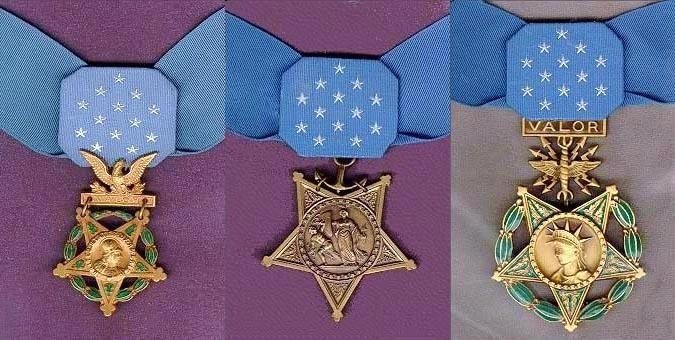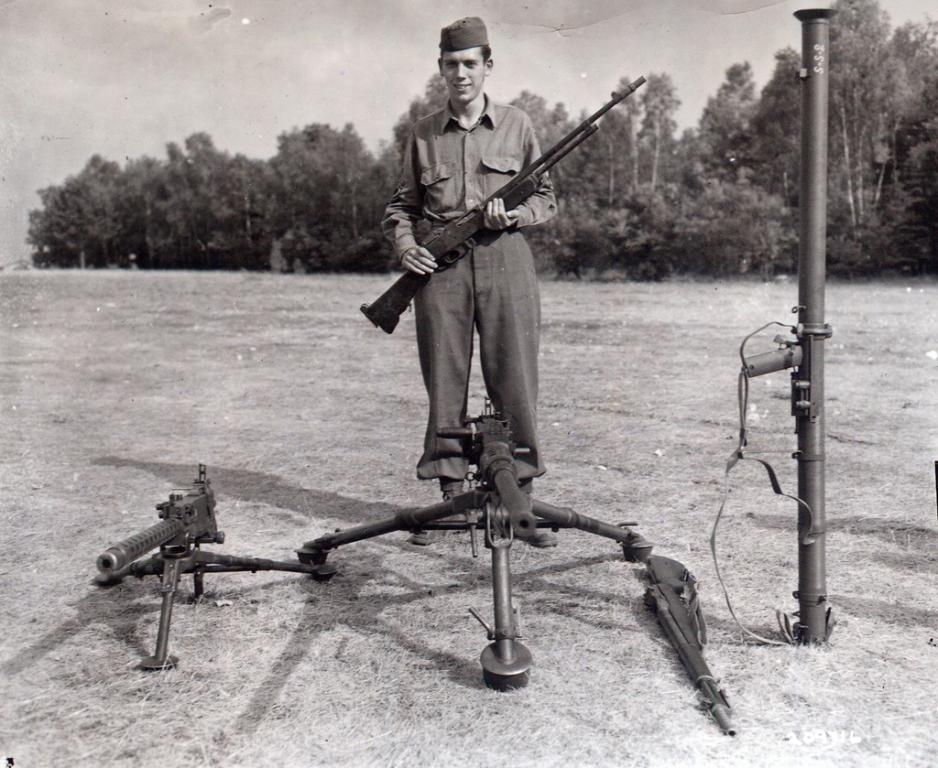Francis Sherman Currey (June 29, 1925 – October 8, 2019)
Currey was born in Loch Sheldrake, New York, on June 29, 1925. After being orphaned at age 12, he was raised by foster parents on a farm in nearby Hurleyville.[1] He joined the Army at age 17, one week after graduating Hurleyville High School.[2] Although he completed Officer Candidate School, at only 18 years old, his superiors felt that he was "too immature" to be an officer and denied him a commission.[3]
T/Sgt Currey used these weapons while halting a Germanattack on his company during the Battle of the Bulge
30th Infantry Division shoulder sleeve insignia
Currey landed at Omaha Beach in July 1944, a few weeks after D-Day. In September, he was assigned as a replacement without winter gear (he later suffered from frostbite) to 3rd Platoon, K Company, 120th Infantry Regiment, 30th Infantry Division, in Netherlands.[3] He saw his first combat action that month. Six weeks later, he would be a sergeant and 3rd Platoon Leader in K Company. On December 21, 1944, Private First Class Currey was an automatic rifleman in a rifle squad which was guarding a bridge crossing and strongpoint. He repeatedly exposed himself to hostile fire while firing upon and killing several German infantrymen during an early morning German tank advance in Malmedy, Belgium. During the attack, he used a bazooka and anti-tank grenades which caused four enemy tank crews to abandon their tanks and also enabled him to rescue five comrades who had been pinned down in a building by enemy fire.After the Battle of the Bulge, he became a squad leader, and was awarded the Silver Star for gallantry in action at his regiment's command post.
In March 1945, Currey's company commander recommended him for the Medal of Honor for his actions on December 21. The Medal of Honor was presented to Currey on July 27, 1945, by the 30th Infantry Division division commander, Major General Leland Hobbs, near Reims, France;[1] the medal was officially awarded to him on August 17, 1945.[6] After the war was over in Europe, he received his 3rd Purple Heart for being shot in Bavaria while disarming German soldiers. He returned to the United Statesin August as a first sergeant after occupational duty and a stop in England
aboard the Queen Mary.
Currey worked as a counselor at the VA Medical Center in Albany, New York from 1950 until he retired as a supervisor, in 1980. After he retired from the VA, he started and ran a landscaping business. He also worked at a hotel booking conventions in Myrtle Beach, South Carolina, until 2002
Only two WW2 MOH recipients are alive today Charles H. Coolidge (98) and Hershel W. Williams (96)
 Information
Information

Warning: This is a relatively older thread
This discussion is older than 360 days. Some information contained in it may no longer be current.
- Knowledge Library

- MKL Entry of the Month
- Australia
- Austro-Hungarian Empire
- Canada
- Czechoslovakia
- Denmark
- Finland
- France/Belgium
- Germany
- Italy
- Japan
- Norway
- Russia
- South America
- Sweden
- Switzerland
- Turkey
- United Kingdom
- United States
- Yugoslavia
- Is my rifle authentic or a fake?
- Jay Currah's Lee Enfield Web Site
- On-line Service Records (Canada)
- Technical Articles/Research
- Forum
- Classifieds

- What's New?
-
Photo Gallery

- Photo Gallery Options
- Photo Gallery Home
- Search Photo Gallery List
-
Photo Gallery Search
- Video Club

- iTrader












 PM
PM
